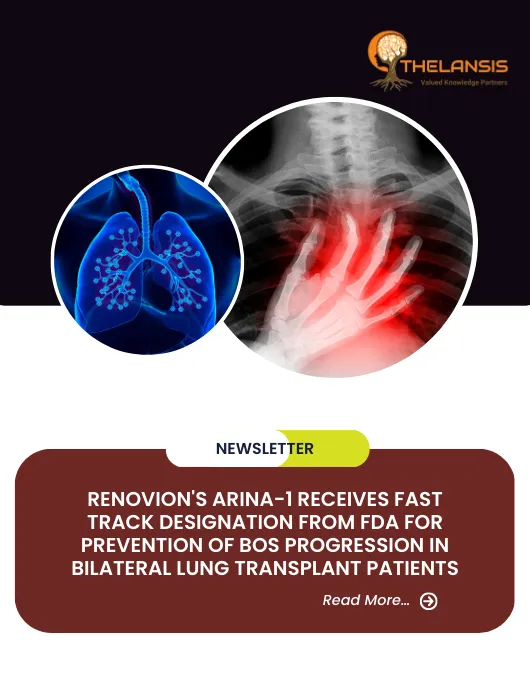
Mar 30 2023
/
Renovion’s ARINA-1 Receives Fast Track Designation from FDA for Prevention of BOS Progression in Bilateral Lung Transplant Patients
Renovion, Inc. has received Fast Track designation from the U.S. Food and Drug Administration (FDA) for ARINA-1, a medicine developed for the prevention of bronchiolitis obliterans syndrome (BOS) progression in adults who have undergone bilateral lung transplant. This designation by the FDA is a recognition of the serious nature of the condition and the unmet medical need for effective treatment options.
Publish Date: 30-03-2023 Source: Renovion, Inc.
Bronchiolitis obliterans syndrome, also known as obliterative bronchiolitis or constrictive bronchiolitis. When it occurs after a lung transplantation or hematopoietic stem cell transplantation (HSCT), it is specifically referred to as bronchiolitis obliterans syndrome. Bronchiolitis obliterans is a type of obstructive lung disease of the small airways, a form of chronic allograft rejection after lung transplantation. The most of lung transplant recipients who are long-term survivors develop bronchiolitis obliterans syndrome. It is estimated that more than 50% of recipients will develop some degree of BO within 5 years post-transplant, with an average time to diagnosis of 16 to 20 months after lung transplant, although it has been reported as early as 3 months after transplantation. Bronchiolitis obliterans characteristically presents with dyspnea and a cough that is persistent and progressive. Some may also have wheezing. Unlike asthma, these symptoms usually develop over weeks to months and are not episodic. The prognosis of bronchiolitis obliterans depends on the underlying pathology. While some patients achieve complete improvement; however, those with the constrictive disease generally demonstrate a more progressive course.
- Around 45% of recipients develop bronchiolitis obliterans syndrome by 5 years post-transplant. The average diagnosis time is 16 to 20 months after lung transplant or as early as 3 months after transplantation.
However, the current Bronchiolitis Obliterans Syndrome (BOS) treatment market share, market uptake, and attribute analysis concerning the most potential emerging therapies (Extracorporeal Photopheresis, Itacitinib, etc..) has been provided under the market outlook section of the study covering 8 MM countries; The United States, EU5 (Germany, Spain, France, Italy, UK) Japan and China.
In terms of pharmacologic therapies, several pharmaceutical products are being approved and under different phases of development for the Bronchiolitis Obliterans Syndrome treatment. The key companies in the advanced development stage are Mallinckrodt, Incyte Corporation, etc..
Based on solid domain and business knowledge, Thelansis Knowledge Partners has published the market outlook forecast report on Bronchiolitis Obliterans Syndrome to provide a clear understanding of disease area background, epidemiology, current and future competitions, the country-specific standard of care, and the complete market forecast for 2022 to 2032.
Thelansis specializes in pharmaceutical market outlook and market forecast reports. We published reports across the therapeutic area, including rare / ultra-rare and mainstream indications. Over the period, we have built a robust repository of 6,000+ Bio-pharma reports that cover Epidemiology studies and Market forecasting based on the KOL opinions.
Competitive intelligence and track of trial results throughout the phases of development executed by a team of a mix of Scientific and Business backgrounds. As an organization, the primary focus is to provide real-world data evidence and market insight to pharmaceutical companies for their decision-making
- Delivery Office:
B-1030, C Wing Vrindavan tech village, Outer ring road
Bangalore- 560037
India+91(124)404-1731
clientsupport@thelansis.com - Sales office:
183 Asylum Street Hartford,
CT-06103, USA
Contact no. +1 (302) 380-3552
m.berg@thelansis.com
Related posts:
- U.S. FDA has granted NuCana Fast Track Designation for Acelarin® for the Treatment of Biliary Tract Cancer.
- DualityBio’s DB-1303 Granted Fast-Track Status by FDA for Advanced Endometrial Cancer Treatment
- Nanoscope Therapeutics’ MCO-010 Receives Fast Track Designation from FDA for Stargardt Disease Treatment
- Caribou Biosciences’ CB-011 Granted Fast Track Designation by FDA for Relapsed or Refractory Multiple Myeloma

